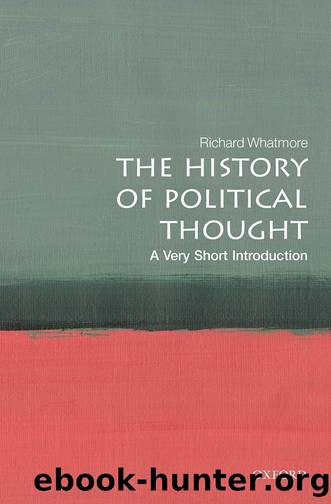The History of Political Thought by Richard Whatmore

Author:Richard Whatmore [Whatmore, Richard]
Language: eng
Format: epub
ISBN: 9780192595355
Publisher: OUP Oxford
Published: 2021-09-23T00:00:00+00:00
Chapter 5
The âCambridge Schoolâ
The origins of the study of political thought in Britain
The so-called Cambridge School of the History of Political Thought has been the most influential among scholars. It rejected Marxist approaches for propagating bad history. Almost every element of the story of the Cambridge School can be contested, including, as the use of the term âso-calledâ implies, its title. The reason for the complexity of the story is that the Cambridge School is accepted as being the product of the labours of three scholars with divergent interests and careers, John Pocock, Quentin Skinner, and John Dunn, all of whom formulated their ideas about how the history of political thought should become a field with a method separately and together in the 1960s. The term âCambridge Schoolâ derives from the fact that all three were associated with the University of Cambridge. Understanding what they found and why they wanted to do things differently requires a short reconstruction of the history of political thought in Britain in general and Cambridge in particular. The story is tied to the history of liberalism, meaning the story of Britain as a prominent liberal state.
Most liberalsâthose who began to use the word to describe themselves in the early 19th centuryâthought that a reformed version of the British constitution operating in different forms of society would maintain order and liberty. Ideally this would be achieved without recourse to the kinds of Christian fanaticism characteristic of the Holy Alliance between Austria, Prussia, and Russia or indeed the civil violence that had marred the French Revolution. Prominent liberals, such as Anne-Louise Germaine de Staël, Benjamin Constant, or Simonde de Sismondi, were all obsessed by the lessons of historical forms of politics for the present. Speculation about avoiding corruption, nationalism, and mercantile imperialism became central to liberal philosophy, while retaining the social hierarchies sufficient to retain order and ensure economic development. Britain without Britishness was one popular definition of liberalism.
At the same time the French Revolution led to the creation of new human sciences. Many radicals who had initially been swayed by the fervour for liberty turned to educational schemes to teach moderation and the avoidance of conflict. Others, such as the poets Samuel Taylor Coleridge and William Wordsworth, moved against having any direct role for the people in government. Jeremy Bentham, who blamed Britainâs mercantile system for rejecting his panopticon prison intended to âgrind rogues honestâ, became convinced that a science of political tactics needed to be constructed. It would teach would-be legislators and politicians how to enact the utilitarian laws that embodied the public good of the greatest number. It would also ensure that such laws were adhered to.
The early 19th century was an age of projects. Liberty and prosperity were the goals of statesmen so long as the worst excesses of revolution were prevented from returning. A new focus upon the education of broader populations led both to the opening up of the universities and the creation of new subjects. At different times and in different places the history of political thought became an independent subject.
Download
This site does not store any files on its server. We only index and link to content provided by other sites. Please contact the content providers to delete copyright contents if any and email us, we'll remove relevant links or contents immediately.
The Secret History by Donna Tartt(19096)
The Social Justice Warrior Handbook by Lisa De Pasquale(12191)
Thirteen Reasons Why by Jay Asher(8914)
This Is How You Lose Her by Junot Diaz(6890)
Weapons of Math Destruction by Cathy O'Neil(6282)
Zero to One by Peter Thiel(5804)
Beartown by Fredrik Backman(5761)
The Myth of the Strong Leader by Archie Brown(5511)
The Fire Next Time by James Baldwin(5450)
How Democracies Die by Steven Levitsky & Daniel Ziblatt(5221)
Promise Me, Dad by Joe Biden(5154)
Stone's Rules by Roger Stone(5088)
A Higher Loyalty: Truth, Lies, and Leadership by James Comey(4965)
100 Deadly Skills by Clint Emerson(4929)
Rise and Kill First by Ronen Bergman(4792)
Secrecy World by Jake Bernstein(4754)
The David Icke Guide to the Global Conspiracy (and how to end it) by David Icke(4720)
The Farm by Tom Rob Smith(4514)
The Doomsday Machine by Daniel Ellsberg(4491)
